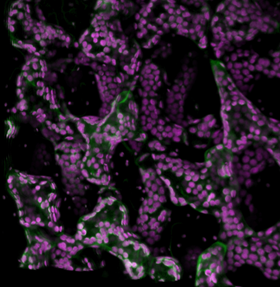Targeted Delivery of Pesticides and Fertilizers in Plants
Background
The limited ability to target the delivery of biochemicals to specific plant tissues and organelles leads to inefficiencies of chemical inputs in agriculture and unintended alterations in plant function. Only a fraction of agrochemicals, including nutrients and pesticides, reach the intended target in crops leading to environmental pollution, low resource use efficiency in plants, and inhibition of key plant physiological and developmental processes. Nanomaterials are emerging as delivery vehicles for chemicals in plants that can be tuned to control their translocation and distribution to plant cells and organelles.
Brief Description
Prof. Juan Pablo Giraldo and his colleagues from the University of California, Riverside have developed a method for targeted nanoparticle delivery and tracking in plants. Engineered nanomaterial (ENM) platforms that bypass biological barriers in plants such as cell walls, membranes, and organelle envelopes for in vivo traceable and targeted delivery of chemicals to organelles (e.g. chloroplasts) and tissues using guiding peptide recognition motifs. The use of these targeted platforms result in the reduction of pesticides and fertilizers.

Fig 1: Confocal microscopy images of chloroplasts in leaf mesophyll cells (purple) containing targeted nanoparticles and their cargoes (green). Chemicals such as paraquat was precisely delivered to chloroplasts by nanoparticles conjugated with targeting peptides.
Applications
- For use in a broad range of nanotechnology applications in plant biology and bioengineering, nanoparticle-plant interactions, and nano-enabled agriculture.
- Results in reduced use of pesticides and fertilizers.
Patent Status
| Country | Type | Number | Dated | Case |
| United States Of America | Issued Patent | 11,186,845 | 11/30/2021 | 2018-282 |
Related Materials
Contact
- Rekha Chawla
- rekha.chawla@ucr.edu
- tel: View Phone Number.
Other Information
Keywords
engineered nanomaterial, ENM, nano-enabled agriculture, targeted nanoparticle delivery
